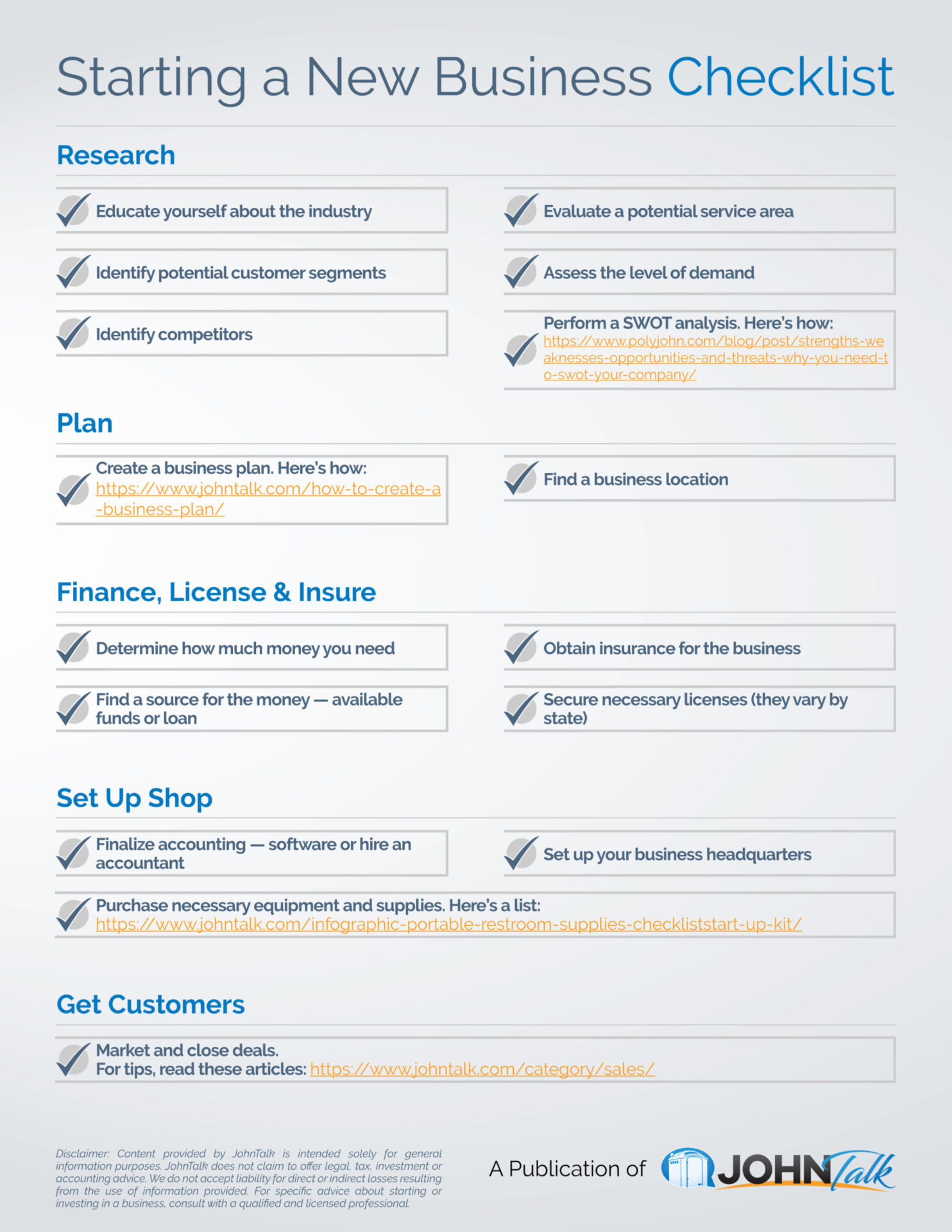
INFOGRAPHIC: Starting a New Business Checklist
February 18, 2019
Lifted Porta-Potty Prank
March 4, 2019You might have noticed that there has been a trend of increased consolidation in the portable sanitation market. Consolidation, as it affects those in the portable sanitation industry, is when a large company (usually of national or regional size) moves into their service area or expands in the area by buying smaller, local companies.
You might see or hear the term “M&A” used in reference to consolidation. It means mergers and acquisitions. For example, the website of United Site Services (USS), with service areas around the country, lists 34 acquisitions, from A Company Portable Restrooms to ZZZ Sanitation. The CEO of USS said he expects M&A efforts by the company to accelerate.
The large, corporate portable sanitation companies serve their customers and communities well. They are representatives of the industry and support its goals. However, from the perspective of the small business owner, which is the focus of this article, consolidation presents challenges. For some small companies, consolidation means opportunity.
How should you respond to consolidation in your service area?
Stay Informed
First, we recommend that you stay current on all the local business news. Network through your Chamber of Commerce, industry social media sites, industry events, PSAI, and the “word on the street” from other local PROs.
Watch for news articles, media releases and social media announcements about consolidation. It will help you get to know your competition, large and small, in your service area, so company names are familiar when you see them mentioned in the news. Also, get to know the names of larger portable sanitation companies, even if they are not currently in your area. Big companies are big news, so their names will usually be the most prominent in news articles or media releases.
Understand the Pros and Cons of Consolidation
When you’re competing against other small portable sanitation companies, it’s generally a level playing field. However, when a “big player” enters the area, it changes the game.
When a large company begins consolidation efforts, its goal is two-fold: to increase its share of the market while reducing the share of competitors.
Large companies have more resources. Through economies of scale, larger companies have stronger purchasing power. They spread their costs over larger volume and can negotiate better prices with suppliers. Smaller companies have higher costs and a lower capital budget.
The big companies have fleets of units at their disposal, as well as many trucks. They can supply services for the largest events without stretching themselves too thin. They have backup inventory, so if they have a problem with a unit, another can quickly take its place, while a one-person operation may have to make repairs a top priority over other work.
The big companies also have more personnel to cover their routes and can offer many employee benefits, while a smaller company might be in a dilemma if one employee gets sick.
The larger companies can spend more on marketing and advertising. So, in addition to seeing their clearly identified units everywhere, they can saturate a market with ads, signage and online presence.
As a result of consolidation, customers usually have fewer options from which to choose. This can result in higher prices. Service may become more anonymous. Customers may no longer enjoy the person-to-person connection that develops when an owner or long-time employee runs the same route month after month. Problems may take longer to resolve due to corporate bureaucracy.
Also, when a company buys out a smaller rival, the sale will almost certainly include a non-compete agreement, in which the owner of the small business agrees not to become a competitor again for an established length of time (such as five years or even longer). This takes an experienced sanitation professional out of the market. Their knowledge and experience are lost, which is a negative for the industry as a whole.
Get the JohnTalk “ALL-ACCESS PASS” & become a member for FREE!
Benefits Include: Subscription to JohnTalk Digital & Print Newsletters • JohnTalk Vault In-Depth Content • Full Access to the JohnTalk Classifieds & Ask a PRO Forum
What Small Businesses Can Do When Facing Competition Due to Consolidation
When a large portable sanitation business becomes your competitor, you should plan a response. Don’t be complacent or take a “business as usual” approach. In fact, some of the suggestions below are appropriate any time you want to “refresh” your business.
Don’t act hastily – especially with prices
Don’t immediately try to make
- It lowers the perceived value of your service
- When you drop your prices, it’s hard to raise them again
- You may get customers who care only about price
You can’t win a price war, and there are many ways you can lose.
Keep your standards high
Stay positive, in both service and attitude. Commit to setting realistic goals that will strengthen your business and add value. Don’t try to compete with plans that will overextend your capabilities and lower quality. For example, don’t add customers to a route so that you can’t possibly have the time to do a thorough job at each site.
The best overall approach is to ignore distractions and focus on the customer experience, because a high standard of service is your best selling point.
Never bad-mouth a competitor.
Look for advantages in the differences between your company and theirs
Get to know your competition. Study their websites. Do a SWOT analysis (strengths, weaknesses, opportunities, threats). You can read more about SWOT here.
Learn what their customers say. The SBA recommends reading media and online reviews at sites such as Yelp, Google Reviews and Angie’s List, as well as local community discussion boards. What do you hear from other PROs?
When you are familiar with your competitor, analyze how your company is different from theirs. How is yours better?
Personal service and cleanliness: two advantages that usually stand out
From years of experience, PROs know that customers ultimately judge the level of service they receive primarily on two key elements – personal service and cleanliness of the units.
Responsive, friendly, knowledgeable of customer needs – personal service takes a lot of time and commitment and is impossible to imitate. Your customers know you’ll go out of your way to help. When they have a problem, they can usually contact you personally. You may even be familiar with each other’s families, hobbies and favorite teams.
Personal service means what is unique to you. We’ve always believed that the heart of your portable sanitation business reflects yourself – your goals, drive to succeed, independent spirit and desire to make your community a better place to live.
Cleanliness of the units is an element of service. But cleanliness attracts the most attention because it defines the actual user experience. It’s most often the ultimate expression of customer satisfaction. And while almost anyone could vacuum out and wipe down a portable toilet, a PRO’s professional touch leaves a unit truly clean, sanitary and fresh-scented.
Make cleanliness a priority of the service process. When you talk to customers, ask them how satisfied they are with the cleanliness of the units so they know how important it is to you. Emphasize cleanliness in your marketing and advertising.
Details can make a difference
Realize that even small advantages make a big difference. Even if it’s just offering units that come with a shelf, hook and cup holder, you may gain an edge over a large company that may offer only a standard unit with few or no accessories.
Touch base with your regular customers
Communication is essential to building a resilient professional relationship. It is a resource; use it. Speak to your customers in person. You can be frank and tell them that a big portable sanitation company is locating in your area, and your response will be to continue to deliver your best service.
Information is a valuable asset that comes through communication. Ask your customers how satisfied they are and why. Ask what you can do to improve service. Follow up conversations by phone or email to answer any questions or for additional information.
Don’t be discouraged if you lose a customer
Never criticize a customer who decides to change to the larger service company. Always leave the door open. A customer who tries another company may find that the service is sub-par compared to yours. A returning customer is more likely to be more loyal the second time around.
Again, use the opportunity to gain information. Ask your customer why he or she chose the larger company. Make sure they know that they can always come back if dissatisfied.
Re-energize your marketing
Stay in front of your customers, to remind them who you are and the service you provide.
- Consider additional ways that you can reward your customers for their loyalty
- Make sure you have stickers with your business information on all units
- Keep your units and trucks clean
- Review your website and advertising to highlight your service standards and community ties
- Renew or re-emphasize your involvement with your Chamber of Commerce and participation in community events
Raise awareness of contributions made by small businesses to your community
While on the job or in your community, you can become a spokesman for support of local, small business. As we often note, there is something about the portable sanitation business that makes people curious to know more – how a portable toilet is cleaned, where the waste goes, etc.
While you are servicing a public or private event, participating in “shop local” or other community programs, use people’s interest to highlight the importance of the small business owner, with yourself as an example.
How does supporting local small businesses help communities? Keep these talking points in mind:
- Keeps a greater share of tax dollars and revenue in the local economy
- Business decisions are made locally by people who have an investment in the community
- Supports entrepreneurship and the American Dream that anyone can own a business
- Small businesses give back to their communities. They support local charities and causes, and donate services, which benefits a community’s well-being.
Promote “economic gardening” in your service area
Many communities spend a lot of time and money in recruiting large companies to invest or locate in their area. There is usually a lot of competition from other cities and regions, and success is never guaranteed. The concept of economic gardening suggests that the investment is better spent on the goal of growing small, local entrepreneurs into larger companies that employ more people. The SBA believes that effective economic development begins at the neighborhood level.
You might introduce the concept of economic gardening or become involved with current efforts through local Chambers of Commerce and economic development agencies. SBA, SCORE and Small Business Development Centers (SBDC) are resources from which to draw.
Take advantage of government opportunities for small businesses
There are many programs specifically created to help woman-owned, minority-owned and SDVOSB-owned (service-disabled, veteran-owned small business) receive work contracts that have been set aside for these groups by federal and state government, as well private entities. Your business must meet certain criteria to qualify for these designations.
Woman-owned means that at least 51% of the company is owned and controlled by one or more women. The women must be U.S. citizens.
The SBA offers women’s business resources here and here.
Minority groups that can qualify include African Americans, Hispanic Americans, Native Americans, Alaska Native Corporations, Indian Tribes, Native Hawaiian Organizations and Community Development Corporations, Asian Pacific Americans and Subcontinent Asian Americans. SBA resources are available by clicking here.
The Service Disabled Veteran (SDV) must have a service-connected disability as determined by the Department of Veterans Affairs or Department of Defense. The business must be at least 51% owned and controlled by an SDV, and the SDV must hold the highest officer position in the company.
SBA information of the Service-Disabled Veteran-Owned Small Businesses program can be found here. Information on the U.S. Department of Veteran Affairs’ “Vets First Verification Program” is here.
Additional information on the SBA’s Office of Government Contracting is at https://www.sba.gov/offices/headquarters/ogc.
Expand your service area
As part of your overall business strategy, you may want to consider expanding the territory you serve or entering a new service area where no large competition exists. Don’t try to expand unless your plans are based on sound business analysis of your capabilities, goals and the new locations.
The SBA offers an introduction to expansion here. You may also want to review the SBA’s 504 loan program, which is designed to help small businesses grow.
Become the buyer
Even if there is no consolidation on the horizon in your service area, you may consider one common option for growing and strengthening your business – buying another portable sanitation company.
When you acquire an established business, you might purchase an entire company itself or just the assets. Businesses have tangible assets, such as trucks, units and property, and intangible assets, including customers and contracts.
You can read an introduction to buying a business by the SBA at https://www.sba.gov/business-guide/plan-your-business/buy-existing-business-or-franchise. The SBA offers a 30-minute, online course “Buying a Business” at https://www.sba.gov/course/buying-business/#course-content.
Big and Small Together
In the portable sanitation industry, large companies can co-exist with the one-truck operator. Together, all can prosper and meet the needs of the public.
Looking to Take Your Portable Restroom Business to the NEXT LEVEL? Download our FREE Guide: “Your Guide to Operating A Portable Restroom Business.”
Thinking About GETTING INTO the Portable Restroom Industry? Download our FREE Guide: “Your Guide to Starting A Portable Restroom Business.”






